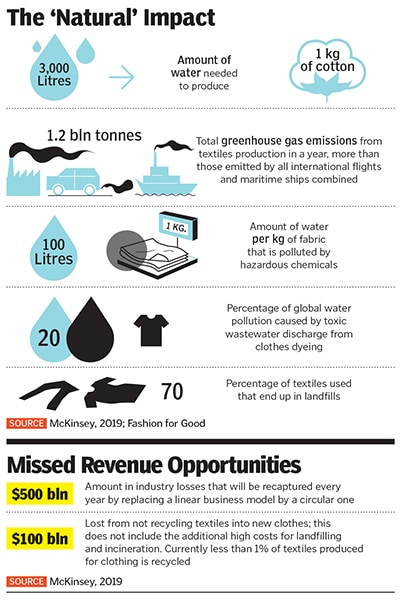Fashion for Good: Taking sustainable ideas mainstream
By connecting innovators with large-scale manufacturers, Fashion for Good is working on making the industry greener


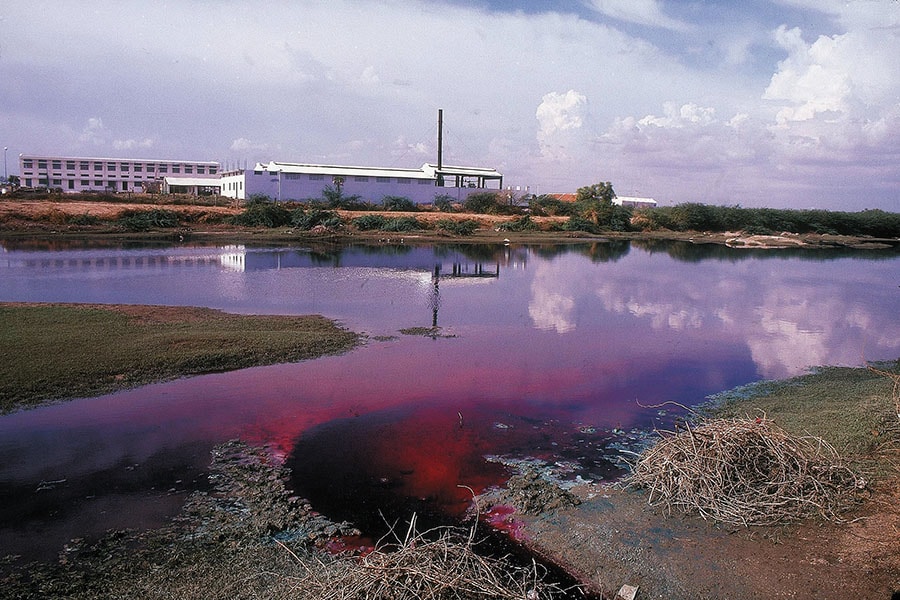 Water pollution by the textile industry in Tiruppur
Water pollution by the textile industry in Tiruppur
Image: HK Rajashekar/The India Today Group Via Getty Images
Among all the talk and concern about greenhouse gas emissions, here is a point to ponder: Today, on an average, we wear any item of clothing 36 percent fewer times than we did 15 years ago. Consequently, more than 50 percent of ‘fast fashion’ clothing items are disposed of in less than a year. Globally, if we all doubled the number of times we wore a piece of clothing, it would reduce greenhouse gas emissions by 44 percent.
The 2019 article by McKinsey & Company, an American consulting firm, which provides this data also adds that not only is the fashion industry one of the largest polluters in the world (see ‘The Natural Impact’), but also lack of mechanisms to recycle textiles costs the industry hundreds of billions of dollars a year (see ‘Missed Revenue Opportunities’). Adding to this is a January 2020 report by Boston Consulting Group and Fashion For Good that says the “innovations emerging in the fashion industry in response to sustainability pressures present unprecedented investment opportunities [estimated to be worth] $20 billion to $30 billion a year”.
Investing in and adopting sustainable technology and practices, therefore, are not just steps towards environmental sustainability for the fashion and textile industry, but towards reaping large economic benefits as well. Keeping this is mind, Fashion for Good—an Amsterdam-based organisation that is bringing together investors, textile manufacturers, fashion brands and innovators—has started its first accelerator programme in South Asia, with an aim to connect innovators and manufacturers so that they can implement and scale up various sustainable solutions.
Fashion for Good started its accelerator programme in Amsterdam, in which it organises workshops, mentoring sessions and meetings between participating innovators and corporate partners. The areas that the programme focuses on include raw materials, dyeing and finishing, manufacturing, retailing, end-of-use and transparency and traceability. So far they have worked with more than 80 innovators and 10 corporate partners.“We decided to enter the South Asia region because not only is it an emerging market for consumption of fashion, but also an important manufacturing region,” says Katrin Ley, managing director, Fashion for Good. “With the launch of our regional programme in South Asia, we strengthen our network, and position ourselves to better serve local manufacturers, key supply chain actors, brands and innovators.”
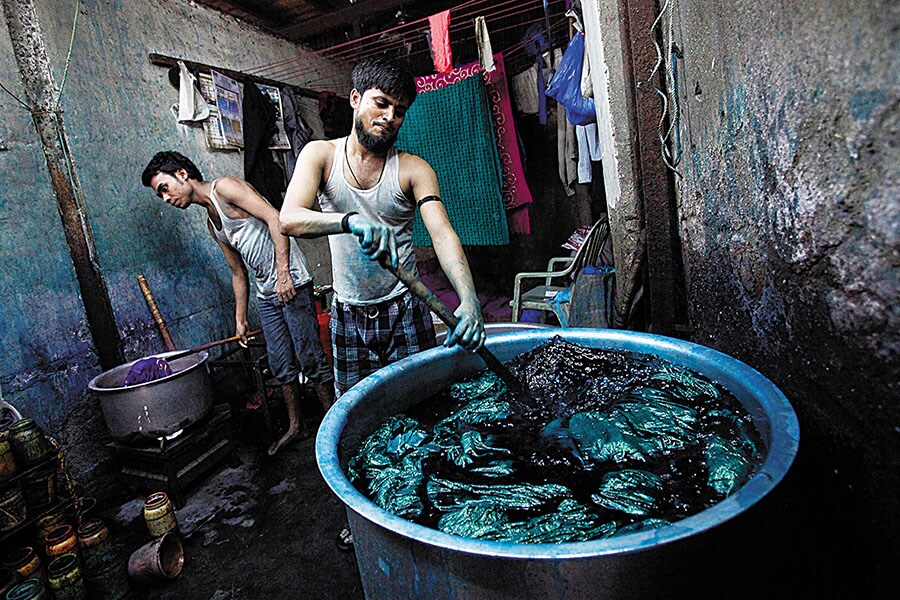 Labourers at a dyeing factory in Mumbai
Labourers at a dyeing factory in Mumbai
Image: Vivek Prakash/Reuters
Established largescale textile and clothing manufacturers often find it difficult to adopt new technologies as they may disrupt existing manufacturing processes and assembly lines, as well as escalate costs. On the other hand, small and young enterprises that have gone through the process of inventing new technology and solutions often find themselves unable to scale up their processes, find industry clients and meet their requirements. Fashion for Good’s accelerator programme addresses this problem by teaming up the selected innovators with the manufacturers so that they work together to evolve the innovations into plug-and-play solutions that can be scaled up, and therefore made suitable for industry-wide adoption.
“The programme brings together the most promising innovators whose technologies are set to transform the industry with manufacturers, like us, on the ground,” says Dipali Goenka, joint managing director, Welspun, one of the corporate partners in the programme. “The platform provides a pool of incredible talent that we can tap into and implement in our own ongoing efforts to move our supply chain towards circularity.”
*****
Over the next four months, the nine innovators selected for the programme will receive mentoring, bespoke coaching and support from Fashion for Good and its corporate partners, while getting access to a global network of partners and like-minded organisations. The South Asia programme has a particular focus on new kinds of raw materials, wastewater management, dyeing solutions, textile waste solutions, and application of block chain and artificial intelligence technologies.
For instance, Ahmedabad-based AltMat uses a combination of mechanical, chemical and enzymatic process to produce industrial-fit fibre and yarn made of agricultural waste such as hemp and banana waste sourced directly from farmers and hemp producers. “These plant fibres present an opportunity for producing materials that are not only environmentally sustainable and socially uplifting, but also have great performance attributes,” says Shikha Shah, founder and CEO of AltMat.
Shah is in the process of mapping different kinds of plantations in the US, Europe, Canada and also in Asia from which to source the raw materials. “We are clear that the material has to be agricultural waste, and not, like in China, hemp that is grown specifically for making textiles,” adds Shah, whose plant is expected to be functional from April. “Sourcing the raw material is the most important aspect, since the soil, water and air conditions of its growing region affect its qualities.” By the end of the accelerator programme, she hopes to achieve a robust testing for her pilot project, increase the market reach of the fibres that she manufactures, and explore more avenues of use of these fibres, such as packaging options.
Like Shah, Krunal Patel, co-founder and COO of Indra Water, too hopes to leverage the fact that the participants in the programme are a diverse bunch of innovators, and there is scope for collaboration. Indra uses technologies such as electro-coagulation and electro-chemical oxidation to separate dissolved pollutants from water. “Electro-coagulation is a robust and broad-spectrum technology, and can treat many different kinds of pollutants,” says Patel. “However, since we are at a nascent stage, we are currently targeting effluents from the textile, paper and pulp, and dairy industries, as well as urban sewage.”
Indra’s technology solution is in the form of a plug-and play treatment system that can be transported and integrated in any existing manufacturing process. With a manufacturing plant in Bhiwandi, on the outskirts of Mumbai, the company has the capacity to manufacture systems that can treat up to 2 lakh litres a day. “We have engagements with six to seven small- to medium-scale companies at the moment,” says Patel. “By the end of this accelerator programme we are hoping to have more pilot opportunities, showcase our technology and its efficacy.”
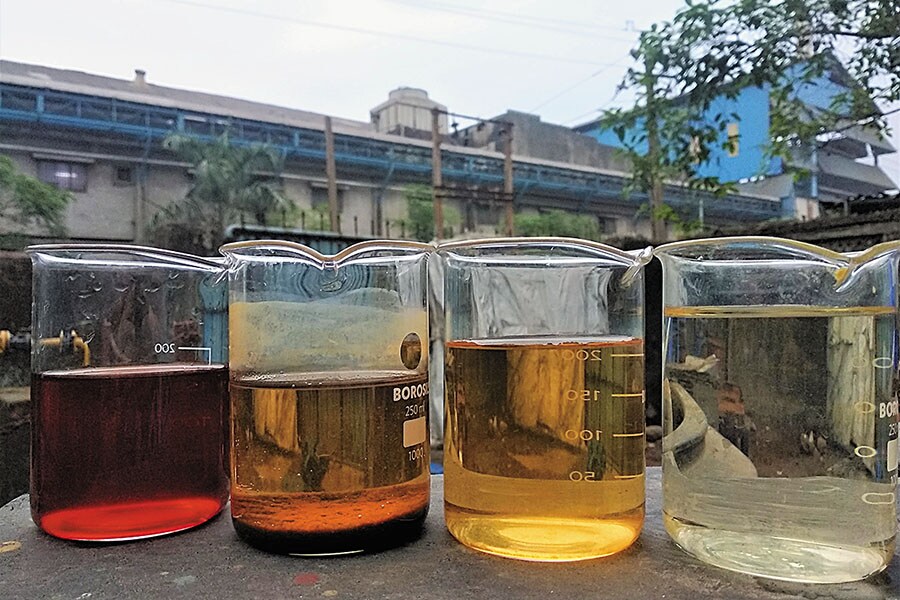 Stages of water treatment using Indra"s technology
Stages of water treatment using Indra"s technology
Also working in the area of water pollution is Chennai-based JSP Enviro that treats common industrial effluents with microbial fuel cells (MFC) technology, which generate energy in the process. The treated water can then be reused, while the energy produced reduces the need for external sources, thus making it a self-sustainable waste water treatment process.
The company was started in January 2019 and works towards restoring polluted natural water bodies such as lakes. “MFC technology is a new method that can treat the effluent to make the water suitable for reuse in industries,” says VT Fidal Kumar, co-founder, JSP Enviro. “We are working on developing a 10,000-litre capacity single chamber MFC to be installed as a pilot scale model for treating textile effluent.”
He expects their product to have a better outreach through the Fashion for Good accelerator programme: “The marketing of our product can be achieved by interaction with textile companies and fashion brands. This programme provides the platform for this interaction which is essential for implementing the product.”
Other innovations in the programme include waterless carbon dioxide-based dyeing from Sasmira (Synthetic and Art Silk Mills’ Research Association), and end-to-end track and trace solutions based on blockchain, artificial intelligence and cloud-based technologies from InfiniChains.
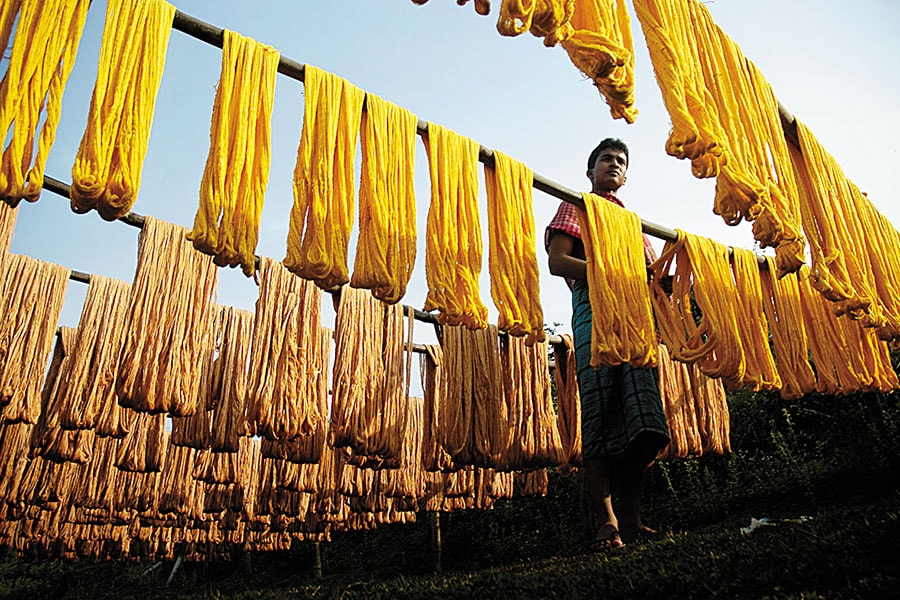 A worker hangs dyed yarn for drying at a textile mill on the outskirts of Agartala
A worker hangs dyed yarn for drying at a textile mill on the outskirts of Agartala
Image: Jayanta Dey/Reuters
Sasmira, for instance, is using technology to eliminate water entirely from the dyeing process. “Conventionally dyeing vats can use very high quantities of water some use 30 kg of water for 1 kg of fabric,” says Rachana Shukla, Scientist B, at Sasmira, which is associated with the Ministry of Textiles. “More recent varieties of machines claim to use less water, but we are not sure of the credibility of the claims. Our dyeing technique does not use any water at all.”
Sasmira’s technology uses carbon dioxide gas that, under high temperature and pressure, converts into a supercritical fluid in which the dye can be dissolved. The fabric is then dyed with this fluid, after which the carbon dioxide can be retrieved again in gaseous form and recycled and reused. “So far the technology can be used to dye synthetic fibres like polyester and nylon. We are continuing our research on dyeing natural fibres as well,” adds Shukla.
The global apparel market is projected to grow in value from $1.3 trillion in 2015 to about $1.5 trillion dollars in 2020, showing that the demand for clothing and shoes is on the rise across the world, according to Statista, with the Asia-Pacific region having the highest rate of growth, at 4 percent. However, as the environmental and social impact of the industry and consumption patterns grow exponentially along with that, the integration of nimble sustainable innovations is probably one way forward in making the industry less damaging.
First Published: Feb 22, 2020, 08:02
Subscribe Now